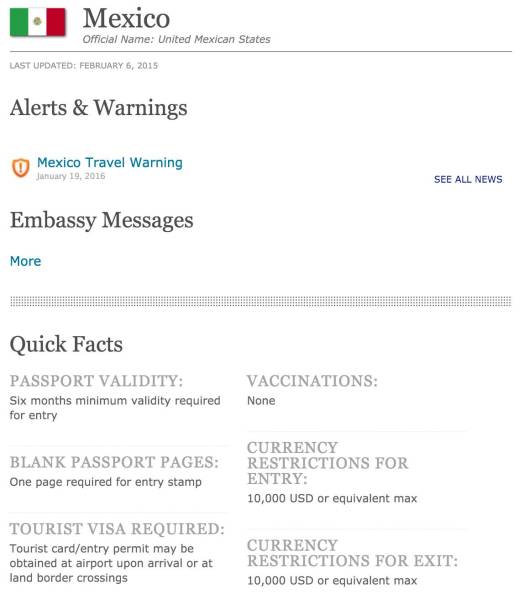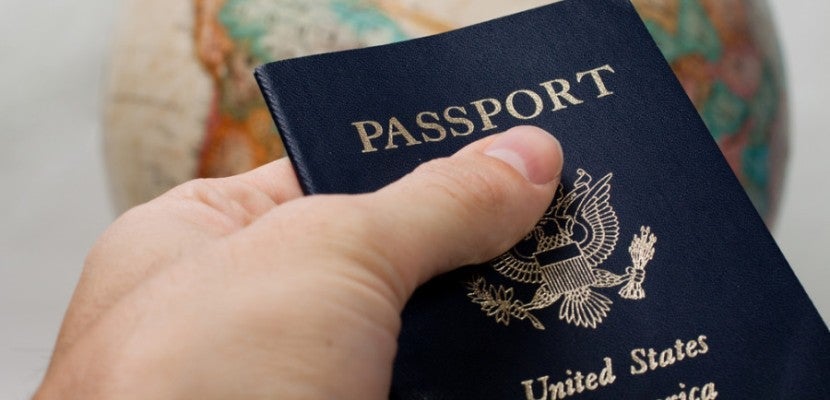Tips for Staying Safe While Traveling Abroad
With the recent terror attacks in Berlin, international safety is front and center in the conversation about travel. While these events are infrequent and of limited scope, it's important to be vigilant and aware of current situations while traveling. We reached out to Beth Finan, a press officer from the US State Department, to find out what travelers can do to stay safe abroad. Here's a look at some of the tools and resources available to help traveling Americans, and some tips for what to do before you go — or if emergencies happen on the road.
Do Some Research Before You Go

First and foremost, familiarize yourself with travel.state.gov. The US State Department has a robust set of resources with information and tips for traveling worldwide. One of the most useful tools on the site is its search engine, full of helpful information on visas, vaccinations and entry and exit requirements, as well as travel waivers that have been issued by the government. You'll find information on every country from Mexico to North Korea, as well as info about security concerns, local laws and regulations and contact information for the primary embassy in that country.
Share Your Travel Plans
The US State Department recommends giving a copy of your itinerary and passport information to friends or family in case you need assistance while abroad. In the event that you need someone to help, they can call 1-888-407-4747 (or 202-501-4444 from outside the US) to get in contact with the State Department.
Sign Up for STEP
The Smart Traveler Enrollment Program (STEP) is a free service that allows American travelers to register their trip with local embassies or consulates abroad. This is especially useful in the unlikely event of a disaster or tragedy, and it will allow the embassy to contact you in case of an emergency.
"You also have the option of providing us with contact information for a family member or close friend who is not traveling with you, who we can contact if you need emergency assistance," said Finan.
Know What to Do During an Emergency

In the event of an emergency — such as personal injury or if you suddenly become trapped — the US State Department recommends that you immediately seek help from first responders, local hospitals or medical professionals. If you're not in immediate danger, contact the nearest embassy or consulate as well so they know where to find you. In cases like this, the government also recommends that you do not seek shelter at a US embassy or consulate — as they may not be accessible during an emergency — and to follow the instructions of local authorities.
"US citizens should contact their loved ones immediately, as they will worry about you," said Finan. "If you don't have an international phone or data plan, many cafes, restaurants and museums abroad have free Wi-Fi. Use text messaging, social media or even a kind stranger's phone to let everyone at home know where you are and that you are okay — provide them with periodic updates in case they have difficulty contacting you directly."
As always, check local news sources for updates and follow @TravelGov on Twitter and Facebook for relevant updates about crises.
Know Where to Find Help Abroad
"The location and phone number of the US embassy (or consulate) is found on the country-specific information pages on travel.state.gov," said Finan. "We recommend travelers write down this information before they depart and keep it with them just in case it is needed."
USEmbassy.gov also has a list of US embassies, consulates and other offices sorted by region, as well as useful information like contact information, addresses and more resources. This is especially useful in less-popular destinations where the US might not have a strong presence. Finan also mentioned that embassy officers are available 24/7 during major emergencies.

Additional Tips
The US State Department recommends that Americans check to see if their US health insurance covers medical expenses abroad, and even consider buying a policy that includes medical evacuations, which could cost $100,000 or more if you don't have insurance.
"Travel insurance is different from health and medical evacuation insurance, and we recommend travelers obtain this as well," said Finan. "Based on the policy, travel insurance may help cover the costs of changing your ticket or paying for a non-emergency evacuation if a crisis happens while you are traveling. Some policies may even help cover the costs of lost belongings."
Check out the US State Department's list of companies that offer these services.
TPG featured card
at Capital One's secure site
Terms & restrictions apply. See rates & fees.
| 5X miles | Earn 5X miles on hotels, vacation rentals and rental cars booked through Capital One Travel |
| 2X miles | Earn unlimited 2X miles on every purchase, every day |
Pros
- Stellar welcome offer of 75,000 miles after spending $4,000 on purchases in the first three months from account opening. Plus, a $250 Capital One Travel credit to use in your first cardholder year upon account opening.
- You'll earn 2 miles per dollar on every purchase, which means you won't have to worry about memorizing bonus categories
- Rewards are versatile and can be redeemed for a statement credit or transferred to Capital One’s transfer partners
Cons
- Highest bonus-earning categories only on travel booked via Capital One Travel
- LIMITED-TIME OFFER: Enjoy $250 to use on Capital One Travel in your first cardholder year, plus earn 75,000 bonus miles once you spend $4,000 on purchases within the first 3 months from account opening - that’s equal to $1,000 in travel
- Earn unlimited 2X miles on every purchase, every day
- Earn 5X miles on hotels, vacation rentals and rental cars booked through Capital One Travel
- Miles won't expire for the life of the account and there's no limit to how many you can earn
- Receive up to a $120 credit for Global Entry or TSA PreCheck®
- Use your miles to get reimbursed for any travel purchase—or redeem by booking a trip through Capital One Travel
- Enjoy a $50 experience credit and other premium benefits with every hotel and vacation rental booked from the Lifestyle Collection
- Transfer your miles to your choice of 15+ travel loyalty programs
- Top rated mobile app

